-
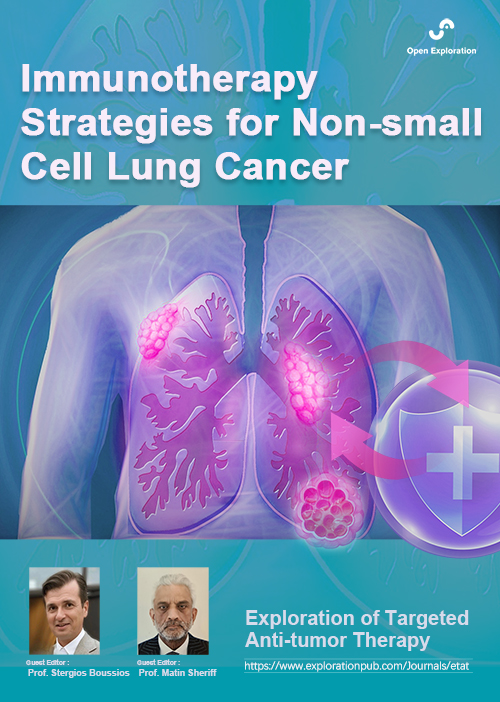 Special Issue Topic
Special Issue TopicImmunotherapy Strategies for Non-small Cell Lung Cancer
Submission Deadline: July 31, 2024Guest Editors
Prof. Stergios Boussios E-Mail
Faculty of Life Sciences & Medicine, School of Cancer & Pharmaceutical Sciences, King's College London, London, UK
Prof. Matin Sheriff E-Mail
Department of Urology, Medway NHS Foundation Trust, Gillingham ME7 5NY, Kent, UK
About the Special Issue
Lung cancer stands as one of the malignancies with a high incidence rate and mortality globally. Non-small-cell lung cancer (NSCLC) constitutes 80% of lung cancer cases, primarily encompassing squamous cell carcinoma (LUSC) and adenocarcinoma (LUAD). The advent of immunotherapy has ushered in a new era in antitumor treatment, with single or combination immunotherapy emerging as first- and second-line treatment strategies for NSCLC.
Immunotherapy, particularly using inhibitors against programmed death protein 1 (PD-1)/its ligand (PD-L1) or cytotoxic T lymphocyte antigen 4 (CTLA-4), represents the most classical and widely applied immune checkpoint inhibitors (ICIs). Despite the significant improvement in overall survival for NSCLC patients across stages I-IV, not all patients exhibit a response to immunotherapy. Oncologists and NSCLC patients confront the challenges of primary and secondary resistance to immunotherapy, as well as progression after treatment discontinuation.
Primary resistance is characterized by tumor progression (PD) or stable disease (SD) noted in the evaluation after < 6 weeks of immunotherapy. Secondary resistance is defined by initial positive responses (complete response, partial response, or SD ≥ 6 months), followed by PD confirmed through imaging scans.
The exploration of strategies to enhance tumor response to immunotherapy holds the potential to bring about a significant advancement in the prognosis of NSCLC. The mechanism underlying immunotherapy resistance is intricate, dynamic, and interdependent. A prerequisite for a clinical response to immunotherapy is a functional cancer-immunity cycle (CIC), which involves the release of cancer cell antigens, presentation of cancer antigens by dendritic cells/APCs, priming and activation of APCs and T cells, trafficking of T cells to tumors, infiltration of T cells into tumors, recognition of cancer cells by T cells, and immune-mediated killing of cancer cells.
Through this Special Issue, our goal is to illuminate the landscape of immunotherapy in oncogene-driven NSCLC patients and the challenges associated with immunotherapy resistance.
Keywords: Non-small-cell lung cancer; Immunotherapy; Molecularly targeted therapy; Immune checkpoint inhibitors; Oncogenic driver alteration; Resistance
Call for Papers
Published Articles
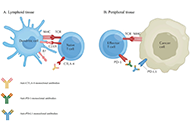 Curative immunotherapy-based strategies for non-metastatic non-small cell lung cancerOpen AccessReviewThe emergence of immunotherapy has ushered in a new era in the management of non-small cell lung cancer (NSCLC). Various immune check point inhibitors have demonstrated significant benefit in the ma [...] Read more.Justin J. Kuhlman ... Yujie ZhaoPublished: December 06, 2024 Explor Target Antitumor Ther. 2024;5:1373–1392
Curative immunotherapy-based strategies for non-metastatic non-small cell lung cancerOpen AccessReviewThe emergence of immunotherapy has ushered in a new era in the management of non-small cell lung cancer (NSCLC). Various immune check point inhibitors have demonstrated significant benefit in the ma [...] Read more.Justin J. Kuhlman ... Yujie ZhaoPublished: December 06, 2024 Explor Target Antitumor Ther. 2024;5:1373–1392
DOI: https://doi.org/10.37349/etat.2024.00281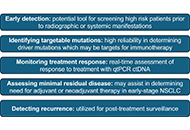 The promises and perils of circulating tumor DNA for monitoring immunotherapy response in non-small cell lung cancerOpen AccessPerspectiveThere has been a rapid expansion of immunotherapy options for non-small cell lung cancer (NSCLC) over the past two decades, particularly with the advent of immune checkpoint inhibitors. Despite the [...] Read more.Brandon Joseph Hebert, James BradleyPublished: November 26, 2024 Explor Target Antitumor Ther. 2024;5:1365–1372
The promises and perils of circulating tumor DNA for monitoring immunotherapy response in non-small cell lung cancerOpen AccessPerspectiveThere has been a rapid expansion of immunotherapy options for non-small cell lung cancer (NSCLC) over the past two decades, particularly with the advent of immune checkpoint inhibitors. Despite the [...] Read more.Brandon Joseph Hebert, James BradleyPublished: November 26, 2024 Explor Target Antitumor Ther. 2024;5:1365–1372
DOI: https://doi.org/10.37349/etat.2024.00280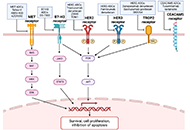 Addressing the unmet need in NSCLC progression with advances in second-line therapeuticsOpen AccessReviewLung cancer is the leading cause of cancer mortality globally, with non-small cell lung cancer (NSCLC) accounting for 85% of cases. Despite advancements in first-line treatments such as immunotherap [...] Read more.Kinsley Wang ... Robert HsuPublished: November 1, 2024 Explor Target Antitumor Ther. 2024;5:1297–1320
Addressing the unmet need in NSCLC progression with advances in second-line therapeuticsOpen AccessReviewLung cancer is the leading cause of cancer mortality globally, with non-small cell lung cancer (NSCLC) accounting for 85% of cases. Despite advancements in first-line treatments such as immunotherap [...] Read more.Kinsley Wang ... Robert HsuPublished: November 1, 2024 Explor Target Antitumor Ther. 2024;5:1297–1320
DOI: https://doi.org/10.37349/etat.2024.00277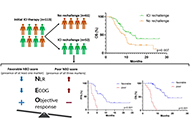 Predictive markers of response to immune checkpoint inhibitor rechallenge in metastatic non-small cell lung cancerOpen AccessOriginal ArticleAim: The present study aims to evaluate the efficacy of rechallenge with immune checkpoint inhibitors (ICIs) compared to chemotherapy and the predictive role of clinical parameters in non-small c [...] Read more.Aram A. Musaelyan ... Sergey V. OrlovPublished: October 18, 2024 Explor Target Antitumor Ther. 2024;5:1271–1288
Predictive markers of response to immune checkpoint inhibitor rechallenge in metastatic non-small cell lung cancerOpen AccessOriginal ArticleAim: The present study aims to evaluate the efficacy of rechallenge with immune checkpoint inhibitors (ICIs) compared to chemotherapy and the predictive role of clinical parameters in non-small c [...] Read more.Aram A. Musaelyan ... Sergey V. OrlovPublished: October 18, 2024 Explor Target Antitumor Ther. 2024;5:1271–1288
DOI: https://doi.org/10.37349/etat.2024.00275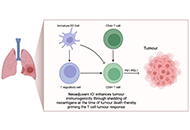 Evidence for the evolving role of neoadjuvant and perioperative immunotherapy in resectable non-small cell lung cancerOpen AccessReviewThe treatment of early-stage non-small cell lung cancer (NSCLC) is becoming increasingly complex. Standard of care management for the past decade has been adjuvant chemotherapy following curative in [...] Read more.Thomas Hansen ... Udit NindraPublished: September 29, 2024 Explor Target Antitumor Ther. 2024;5:1247–1260
Evidence for the evolving role of neoadjuvant and perioperative immunotherapy in resectable non-small cell lung cancerOpen AccessReviewThe treatment of early-stage non-small cell lung cancer (NSCLC) is becoming increasingly complex. Standard of care management for the past decade has been adjuvant chemotherapy following curative in [...] Read more.Thomas Hansen ... Udit NindraPublished: September 29, 2024 Explor Target Antitumor Ther. 2024;5:1247–1260
DOI: https://doi.org/10.37349/etat.2024.00273 -
-
Ongoing Special Issues
-
Completed Special Issues